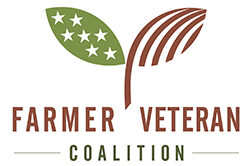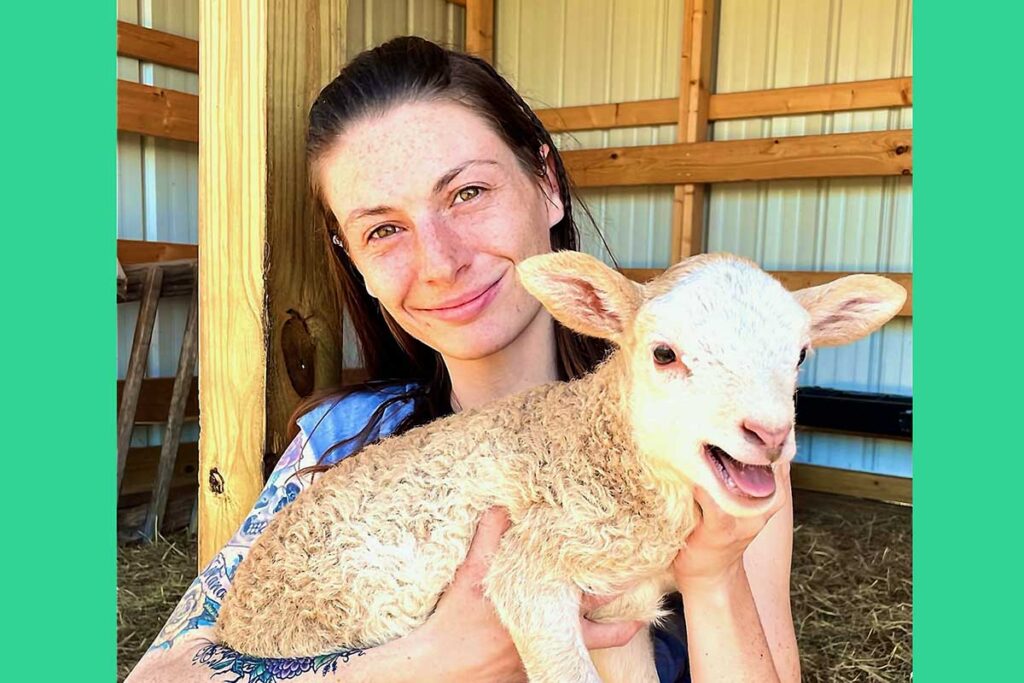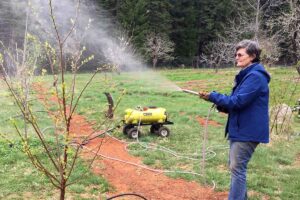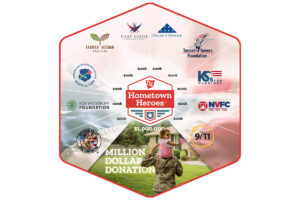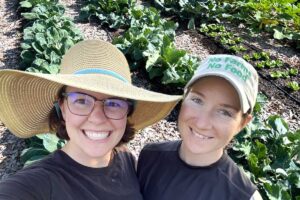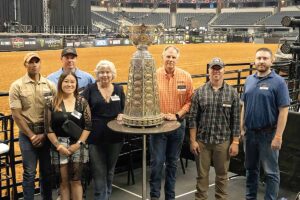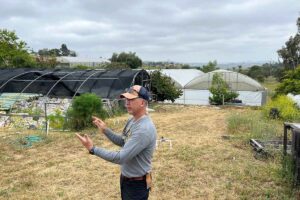Tessa Krull remembers in 2020 when she purchased the land that is now The Green Woman Farm. It was not much to look at.
“It was sand, clay and termites everywhere,” she said.
But with old-fashioned hard work and helpful neighbors she began turning those 12½ acres of Central Texas wasteland into an agro-forest teeming with edible fruit trees, herbs and vegetables – a hybrid farm committed to regenerative agriculture.
On the day of a phone interview for this story, she was excited about the birth of twin lambs at the farm, adding to the contingent of goats, sheep, chicken, ducks and guinea fowl that roam the property.
She’s also quick to sing the praises of the Farmer Veteran Coalition’s Fellowship Fund grant she received. The grant, sponsored by the Wounded Warrior Project, enabled her to purchase a multitude of needed items for her farm: wheelbarrows, an irrigation kit with timer, crop row netting and covers, nine cover-crop seeds, as well as hand tools, shovels, and a scuffle hoe.
“That grant was been so important,” said Tessa, who said she decided she wanted to be a farmer when she was a 5-year-old growing up in Alaska.
Tessa worked in a plant nursery at age 13 and started gardening. She learned about the different species of plants as she sold and cared for those plants in the nursery.
“I started growing herbs as an adult because they were too expensive for me to buy in stores,” she said.
Army Service
Tessa was an IT (information technologies) specialist in the Army, serving at Osan Air Base in South Korea under the 35th Air Defense Artillery Brigade before ending her five years of military service at Fort Hood (now Fort Cavazos).
She parlayed that knowledge post-military into a cyber security job in Austin, Texas. It enabled her to set aside money for five years to purchase the property located between Bastrop and Elgin, just east of Austin.
Tessa concedes that the farm’s name started after local residents referred to her as the “Green Woman” when she got started on the unforgiving land in 2020. After closing on the property, she learned it was used as a trash dump, was overgrazed and was infested with termites.
“I can take pride that I’ve changed that piece of land,” she said. She’s also been heartened by neighbors’ comments that they are pleased to see the property is no longer a barren pasture.
“I’m a disabled Veteran and I’m making it work,” she said.
She volunteers and the farm sponsors local nonprofits in Elgin like Simple Promise Farms and Down Home Ranch. Her products, which include farm-fresh eggs and teas, are sold online and at farmers markets.
The single mom hopes her two young daughters will one day understand the work ethic involved in running a farm, adding that her Army experience was perfect for instilling self-discipline.
Growing Crops
She enjoys growing herbs that are not readily available locally, and especially loves growing bananas, roses and lavender. Some 70 species of crops are grown on her farm.
“We grow herbs to help avoid the use of pesticides with our plants and produce, in turn, this creates a healthier result for people to eat,” Tessa said. “We work with animals to make our own compost and avoid the use of artificial fertilizers.
“This affects our yield initially, but grows rich topsoil over time and I have seen these results here.”
Being able to use the Fellowship Fund to purchase cover-crop seed was critical for essentially growing the feed on which the goats and sheep forage.
“It’s a self-sustaining ecosystem,” Tessa said, adding that she’s looking forward to springtime when the clover she put down will green up her property.
Purchasing crop row netting and covers provided protection from insects and weather. It was extremely important for frost protection, she said. Her crops had a 90% survival rate this year compared with a 40% survival rate before, she said.
Her chickens, ducks and guinea fowl help with pest management.
She admits to self-teaching herself farming through research, but said new farmers shouldn’t be afraid to ask for help.
“Be humble,” she said. “I know I don’t know near enough. Anyone can farm. If you need help, just reach out. It’s great to become part of the community.”
Website: www.greenwomanfarm.com
Facebook: https://www.facebook.com/TheGreenWomanFarm/
Instagram: https://www.instagram.com/greenwomanfarm20/
